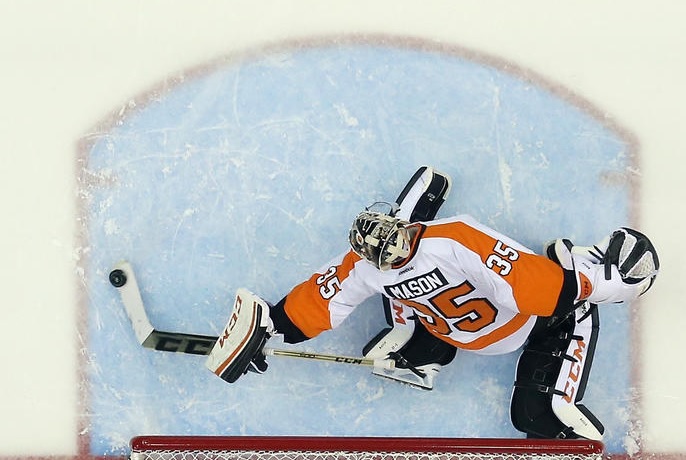
 “Goaltender controversy” is perhaps the most overused expression in Philadelphia Flyers history.
“Goaltender controversy” is perhaps the most overused expression in Philadelphia Flyers history.
It has loomed over the Flyers’ franchise for the past decade and a half as the organization has not had a “franchise” goaltender to claim as a starter in that span.
That isn’t to say the goaltending has been all bad. Even Ilya Bryzgalov had his moments of brilliance, including a club record during the 2011-12 season for the longest shutout streak at 249:43.
The contract hastily awarded to the former Flyer nyetminder has left a bitter taste in fans’ mouths, though, as neither “Bryz” nor any goaltender could have lived up to those leviathan expectations.
It is with that trepidation that the Flyers’ announcement of a three year, $12.3 million contract extension to starter Steve Mason has made some uneasy.
Through 36 games, Mason ranks 15th in the NHL in save percentage (“SPT”) among goaltenders with at least 20 starts. He has managed a respectable 0.917 SPT while playing behind the 7th worst team in shots-against-per-game. Only Robin Lehner of the Ottawa Senators and Ryan Miller of the Buffalo Sabres have played behind a worse defense and produced better numbers.
In other words, this isn’t a case of a defensive-heavy system shielding a goaltender and inflating his value. Mason has been the MVP for much of the 2013-14 NHL season, bailing out his teammates through the early season struggles before regressing a bit in the last month.
It’s the recent dip in play (0.896 SPT in last ten games) that raises concerns over any extension. As already mentioned, the Flyers have received some excellent goaltending in the past without necessarily having a consistent performer between the pipes.
Consider the following:
- 2010-11 NHL season – Brian Boucher, 34 games played, 0.916 SPT
- 2009-10 NHL season – Michael Leighton, 27 games played, 0.918 SPT
- 2008-09 NHL season – Marty Biron, 55 games played, 0.915 SPT
- 2007-08 NHL season – Marty Biron, 62 games played, 0.918 SPT
None of these players would be argued as “franchise” starters as much as quality back-ups who have exceeded expectations and elevated their game at certain junctures of their career.
Thirty-six games may have been enough for the Flyers to make a judgment call on Steve Mason, but the sample size isn’t really enough to prove that he truly is the answer to the Flyers’ issues in net for the long-term.
As far as the actual deal itself? It’s definitely manageable in the salary cap era, and that’s all that you could really ask of general manager Paul Holmgren. Three years is enough term to be fair to a restricted free agent while not handcuffing the organization to another lifetime contract.
The salary cap hit is not out of the realm for a player anticipated to be the starter despite one year remaining as a restricted free agent. It’s the nature of the beast.
After all of the financial concerns that nearly cancelled the 2013 NHL season, the salary cap is expected to be raised above $71 million for next season. Even if Mason’s play does not live up to expectations, the team will likely be able to absorb any impact his contract would have on the team from a roster management perspective.
The contract does not include a no-trade-clause either.
Steve Mason didn’t “break the bank” with this contract extension because he has yet to prove he is a franchise goaltender. For the team’s current MVP, though? This deal makes sense and can work.
Until the next controversy, that is.